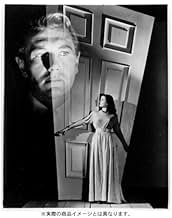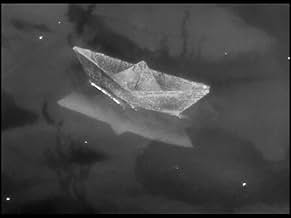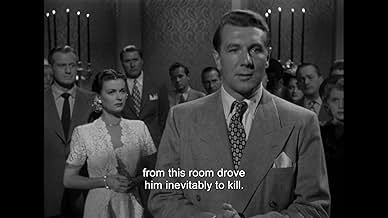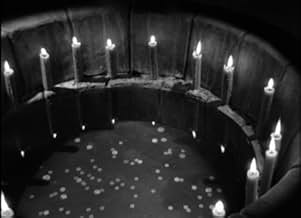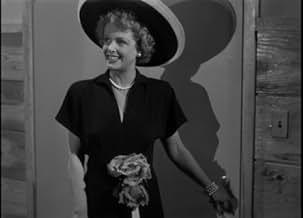NOTE IMDb
6,6/10
6,2 k
MA NOTE
Une femme suspecte que son nouveau mari veuille la tuer lorsqu'ils s'installent dans un vieux manoir de la côte Est.Une femme suspecte que son nouveau mari veuille la tuer lorsqu'ils s'installent dans un vieux manoir de la côte Est.Une femme suspecte que son nouveau mari veuille la tuer lorsqu'ils s'installent dans un vieux manoir de la côte Est.
- Réalisation
- Scénario
- Casting principal
Robert Barber
- Altar Boy
- (non crédité)
Ray Beltram
- Townsman
- (non crédité)
Virginia Brissac
- Sarah
- (non crédité)
Ralph Brooks
- Guest in Home Tour
- (non crédité)
Albert Cavens
- Guest in Home Tour
- (non crédité)
Tom Chatterton
- Judge
- (non crédité)
David Cota
- Small Mexican Knife Fighter
- (non crédité)
Frank Dae
- Country Squire
- (non crédité)
Avis à la une
Pseudo-Hitch intriguing drama about a woman who gradually realizes she is married to a killer and may be next on his list .This classic suspense film contains emotion , intrigue , chills, and evocative scenarios . When a lovely as well as wealthy heiress named Celia (Joan Bennett) spends a fun holiday she meets a good-looking guy called Mark Lamphere and ends up falling in love with him . Later on , she marries the widower (Michael Redgrave's first American film) and finds out weird happenings about him . She and her new husband, settle in an ancient mansion on the East coast, she discovers he may want to kill her . Understandably , she wonders what plans he might have for her . The mansion has got a lot of rooms that are replicas of known murder sites . In the tour of the three rooms, Mark Lamphere recounts the tales of three murders, all of which are fictional. However in the first room, he mentions the St Bartholomew's Day massacre and the Guise family in France. The massacre is a real historical event, where French Roman Catholics attacked French Huguenots (Protestants) on 24th of August 1572 resulting in many deaths.
Dazzling Hitch/style suspense movie about a beautiful woman marries a rare man with a shock revelation around every corner their mansion . It packs hallucination , treason , Bennett plays a rich wife trying to help her hubby , well played by Michael Redgrave , who is suffering from amnesia and who might be a murderer too . The picture takes elements from classic Hitchcock films , carrying out a crossover among ¨Suspicion ¨, ¨Spellbound¨ and ¨Rebeca¨ . In fact ,Fritz Lang's attempt to do his version of Rebeca (1940) was a project fraught with disaster. It ran over budget and over schedule, while Lang was at constant loggerheads with his leading lady, Joan Bennett . As it stars the great Joan Bennett , being compellingly directed by Lang ; but it is not as outstanding as their former movies together : ¨Man hunt¨, ¨The woman in the window¨ and ¨Scarlet street¨. Support cast is pretty good such as Anne Revere as Caroline Lamphere , Barbara O'Neil as Miss Robey and Paul Cavanagh as Rick Barrett .
Atmospheric as well as mistly cinematography in black and white by Stanley Cortez . Thrilling and frightening musical score by the classic Miklos Rozsa . The motion picture was professionally directed by Fritz Lang . Lang directed masterfully all kind of genres as Noir cinema as ¨Big heat , Scarlet Street and Beyond a reasonable doubt¨ , Epic as ¨Nibelungs¨, suspense as ¨Secret beyond the door, Clash by night¨ , Western as ¨Rancho Notorious and Return of Frank James ¨ and of course Adventure as ¨Moonfleet¨ .
Dazzling Hitch/style suspense movie about a beautiful woman marries a rare man with a shock revelation around every corner their mansion . It packs hallucination , treason , Bennett plays a rich wife trying to help her hubby , well played by Michael Redgrave , who is suffering from amnesia and who might be a murderer too . The picture takes elements from classic Hitchcock films , carrying out a crossover among ¨Suspicion ¨, ¨Spellbound¨ and ¨Rebeca¨ . In fact ,Fritz Lang's attempt to do his version of Rebeca (1940) was a project fraught with disaster. It ran over budget and over schedule, while Lang was at constant loggerheads with his leading lady, Joan Bennett . As it stars the great Joan Bennett , being compellingly directed by Lang ; but it is not as outstanding as their former movies together : ¨Man hunt¨, ¨The woman in the window¨ and ¨Scarlet street¨. Support cast is pretty good such as Anne Revere as Caroline Lamphere , Barbara O'Neil as Miss Robey and Paul Cavanagh as Rick Barrett .
Atmospheric as well as mistly cinematography in black and white by Stanley Cortez . Thrilling and frightening musical score by the classic Miklos Rozsa . The motion picture was professionally directed by Fritz Lang . Lang directed masterfully all kind of genres as Noir cinema as ¨Big heat , Scarlet Street and Beyond a reasonable doubt¨ , Epic as ¨Nibelungs¨, suspense as ¨Secret beyond the door, Clash by night¨ , Western as ¨Rancho Notorious and Return of Frank James ¨ and of course Adventure as ¨Moonfleet¨ .
Secret Beyond the Door is directed by Fritz Lang and adapted to screenplay by Silvia Richards from a story by Rufus King. It stars Joan Bennett, Michael Redgrave, Anne Revere, Barbara O'Neil and Natalie Schafer. Music is by Miklós Rózsa and cinematography by Stanley Cortez.
After a whirlwind romance, Celia Barrett (Bennett) marries Mark Lamphere (Redgrave) but finds once the honeymoon is over his behaviour becomes quite odd...
A troubled production and troubling reactions to it by the critics and Lang himself! Secret Beyond the Door is very much in the divisive half of Lang's filmic output. Taking its lead from classic era Hollywood's keen interest with all things Freudian, and doffing its cap towards a number of "women in peril at home" films of the 1940s, it's a picture that's hardly original. Yet in spite of some weaknesses in the screenplay that revolve around the psychological troubles of Mark Lamphere, this is still a fascinating and suspenseful picture.
I married a stranger.
Draped in Gothic overtones and astonishingly beautiful into the bargain, it's unmistakably a Lang film. His ire towards the cast and studio, where he was usurped in the cutting room and with choice of cinematographer, led Lang to be very dismissive towards the piece. However, it contains all that's good about the great director. Scenes such as the opening involving a paper boat on ripples of water, or a sequence that sees Mark dream he is in a courtroom full of faceless jurors, these are indelible images. Then there's the lighting techniques used around the moody Lamphere mansion that are simply stunning, with Cortez (The Night of the Hunter) photographing with atmospheric clarity.
Blades Creek, Levender Falls.
Elsewhere the characterisations are intriguing. Mark is troubled by something and we learn it's about women in his life, while his "hobby" of reconstructing famous murder scenes in the rooms of the mansion, is macabre and really puts a kinky distortion in the narrative. Celia marries in haste but is surprisingly strong, her character arc given heft by the fact we think she may well be prepared to die for love. Then there's the house secretary, Miss Robey (O'Neil), a shifty woman with a headscarf covering an unsightly scar on one side of her face, and Mark's young son David (Mark Dennis) who is cold and detached and has some disturbing theories on his father's means and motivations.
Lilacs and locked doors.
Cast performances are not all top grade, and even though Redgrave doesn't push himself to required darker territories, the performances are involving and worthy of the viewer's undivided attention. Rózsa's musical score is a cracker, deftly switching from the romantic swirls that accompany Mark and Celia during their love courting, to being a stalking menace around the Lamphere house and misty grounds when danger and psychological distortion is near by. Technically it's a remarkable movie, where even allowing for some daftness involving the psychobabble, it's a picture that Lang fans can easily love. There are those who detest it, very much so, but if it does hit your spot it will get inside you and stay there for some time afterwards. 8/10
After a whirlwind romance, Celia Barrett (Bennett) marries Mark Lamphere (Redgrave) but finds once the honeymoon is over his behaviour becomes quite odd...
A troubled production and troubling reactions to it by the critics and Lang himself! Secret Beyond the Door is very much in the divisive half of Lang's filmic output. Taking its lead from classic era Hollywood's keen interest with all things Freudian, and doffing its cap towards a number of "women in peril at home" films of the 1940s, it's a picture that's hardly original. Yet in spite of some weaknesses in the screenplay that revolve around the psychological troubles of Mark Lamphere, this is still a fascinating and suspenseful picture.
I married a stranger.
Draped in Gothic overtones and astonishingly beautiful into the bargain, it's unmistakably a Lang film. His ire towards the cast and studio, where he was usurped in the cutting room and with choice of cinematographer, led Lang to be very dismissive towards the piece. However, it contains all that's good about the great director. Scenes such as the opening involving a paper boat on ripples of water, or a sequence that sees Mark dream he is in a courtroom full of faceless jurors, these are indelible images. Then there's the lighting techniques used around the moody Lamphere mansion that are simply stunning, with Cortez (The Night of the Hunter) photographing with atmospheric clarity.
Blades Creek, Levender Falls.
Elsewhere the characterisations are intriguing. Mark is troubled by something and we learn it's about women in his life, while his "hobby" of reconstructing famous murder scenes in the rooms of the mansion, is macabre and really puts a kinky distortion in the narrative. Celia marries in haste but is surprisingly strong, her character arc given heft by the fact we think she may well be prepared to die for love. Then there's the house secretary, Miss Robey (O'Neil), a shifty woman with a headscarf covering an unsightly scar on one side of her face, and Mark's young son David (Mark Dennis) who is cold and detached and has some disturbing theories on his father's means and motivations.
Lilacs and locked doors.
Cast performances are not all top grade, and even though Redgrave doesn't push himself to required darker territories, the performances are involving and worthy of the viewer's undivided attention. Rózsa's musical score is a cracker, deftly switching from the romantic swirls that accompany Mark and Celia during their love courting, to being a stalking menace around the Lamphere house and misty grounds when danger and psychological distortion is near by. Technically it's a remarkable movie, where even allowing for some daftness involving the psychobabble, it's a picture that Lang fans can easily love. There are those who detest it, very much so, but if it does hit your spot it will get inside you and stay there for some time afterwards. 8/10
Fritz Lang's creepy and atmospheric psychological thriller, 'Secret Beyond the Door (1948),' faces just one major obstacle that prevents it from being a completely satisfying film experience: the story is quite obviously derived from Hitchcock's 'Rebecca (1940),' which happens to be a superior film in almost every regard. This is not to question the talents or originality of Lang, since, of course, he was already an established director before Hitchcock ever got his break, but you can just tell how much this particular work was influenced by the Master of Suspense. Borrowing elements from the then-prevalent film noir movement, and adding shades of post-marriage paranoia from the likes of 'Rebecca' and Cukor's 'Gaslight (1944),' Lang also mixes in snippets of Freudian psychoanalysis, not unlike what I witnessed last week in Hitchcock's own 'Spellbound (1945).' The final product is not without its charm, and contains various moments of precisely-articulated suspense, but you can never overcome that niggling feeling that you've seen it all done better.
Joan Bennett plays Celia, a young lady who acquires a large amount of money after her brother's death and decides to take a holiday. It is here that she meets Mark Lamphere (Michael Redgrave), a mysterious and charming gentleman who excites in Celia intense suppressed feelings of rebellion and exhilaration. Following their marriage, a hastily-decided proposition that can only lead to trouble, Celia immediately begins to notice peculiarities in her new husband, and, after her arrival at Mark's extravagant residence, she finds the dwelling haunted by the shadow of his previous wife. Mark, it seems, houses an unhealthy preoccupation with murder, and has made a hobby out of collecting entire rooms in which unspeakable atrocities of passion were committed. But what of the one room that is kept securely locked, never to be opened by anyone? Celia concludes that the secret to unlocking the inner depths of her husband's disturbed mind lies within that single room, beyond the forbidden door. Though Silvia Richards' screenplay, from a story by Rufus King, often seems too incredible to take seriously, Lang's film remains an interesting achievement, and is nothing if not entertaining.
I found the promotional material for 'Secret Beyond the Door' to be grossly misleading. The image of Joan Bennett standing before a significantly-distorted door prompted me to expect a film of extreme German Expressionism, in the same vein as 'The Cabinet of Dr. Caligari (1920).' Fritz Lang, who developed his career in Germany during the 1920s, and having often used elements of the style, would presumably have been very adept at recreating the devilishly-twisted labyrinths of the human mind, but the only scene to even approach my stylistic expectations was the appropriately ambiguous and shadowy dream sequence, in which Michael Redgrave both prosecutes and defends his malevolent tendencies in court {this particular scene may even have influenced Hitchcock's heavily-stylised courtroom trial in 'Dial M for Murder (1954)}. The remainder of the film has the appearance of a typical 1940s film noir, with suitably shadowy cinematography by Stanley Cortez, supplemented by a voice-over by Joan Bennett. Also note the similarity between the character of Miss Robey (Barbara O'Neil) and Mrs. Danvers (Judith Anderson) from 'Rebecca,' most particularly in their respective final actions in each picture.
Joan Bennett plays Celia, a young lady who acquires a large amount of money after her brother's death and decides to take a holiday. It is here that she meets Mark Lamphere (Michael Redgrave), a mysterious and charming gentleman who excites in Celia intense suppressed feelings of rebellion and exhilaration. Following their marriage, a hastily-decided proposition that can only lead to trouble, Celia immediately begins to notice peculiarities in her new husband, and, after her arrival at Mark's extravagant residence, she finds the dwelling haunted by the shadow of his previous wife. Mark, it seems, houses an unhealthy preoccupation with murder, and has made a hobby out of collecting entire rooms in which unspeakable atrocities of passion were committed. But what of the one room that is kept securely locked, never to be opened by anyone? Celia concludes that the secret to unlocking the inner depths of her husband's disturbed mind lies within that single room, beyond the forbidden door. Though Silvia Richards' screenplay, from a story by Rufus King, often seems too incredible to take seriously, Lang's film remains an interesting achievement, and is nothing if not entertaining.
I found the promotional material for 'Secret Beyond the Door' to be grossly misleading. The image of Joan Bennett standing before a significantly-distorted door prompted me to expect a film of extreme German Expressionism, in the same vein as 'The Cabinet of Dr. Caligari (1920).' Fritz Lang, who developed his career in Germany during the 1920s, and having often used elements of the style, would presumably have been very adept at recreating the devilishly-twisted labyrinths of the human mind, but the only scene to even approach my stylistic expectations was the appropriately ambiguous and shadowy dream sequence, in which Michael Redgrave both prosecutes and defends his malevolent tendencies in court {this particular scene may even have influenced Hitchcock's heavily-stylised courtroom trial in 'Dial M for Murder (1954)}. The remainder of the film has the appearance of a typical 1940s film noir, with suitably shadowy cinematography by Stanley Cortez, supplemented by a voice-over by Joan Bennett. Also note the similarity between the character of Miss Robey (Barbara O'Neil) and Mrs. Danvers (Judith Anderson) from 'Rebecca,' most particularly in their respective final actions in each picture.
The Secret Beyond the Door is Fritz Lang's melodramatic suspense tale that seems to have taken more than it's fair share of influence from Alfred Hitchcock's Rebecca. Before the story even starts, we're waiting to find out one thing - what's the secret? This somewhat puts the movie on the back foot from the start, as all that we see is build up to the big finale, which basically means that the pay off has to be pretty good otherwise the whole film will fall apart. The final twist, in fact, doesn't really do the build up justice; but it's not absolutely terrible, and I would still rate this film as at least 'good', but just don't tune in expecting anything brilliant. This is certainly no 'M', for example. The plot follows a young woman that goes on holiday and meets a charming middle-aged man. The two later get married and she accompanies him back to his house where she meets his son, and finds his collection of rooms, one of which is kept locked up. What is the secret beyond the door...?
Fritz Lang's bleak cinematography and haunting use of music help to create the atmosphere that a story of this nature needs in order to work effectively. The focus on the door helps to create the tension as to what the secret is throughout the movie, and Fritz Lang seems keen to capitalise on that as we see Joan Bennett's narration change from how she feels personally to driving herself crazy as she tries to decipher what's behind the door. The characters in the story are interesting, and they need to be as this film is mostly character based. We follow Celia Lamphere, and we are given her thoughts by way of the aforementioned narration. Narration is often found in scripts that have been written by people that don't know how to write good scripts. However, in this case it actually helps the film to move along. In order for the story to work, we need to know what the character is feeling, so in this case narration is helpful to the story.
As I've mentioned, the ending isn't all that good, but the suspense builds nicely and there's much to like about this film. If you're new to Fritz Lang, though, I certainly recommend the classics 'M' and 'Metropolis' before this, and also from his American films; 'Fury', 'Scarlet Street', 'Beyond a Reasonable Doubt' and 'While the City Sleeps' get my thumbs up.
Fritz Lang's bleak cinematography and haunting use of music help to create the atmosphere that a story of this nature needs in order to work effectively. The focus on the door helps to create the tension as to what the secret is throughout the movie, and Fritz Lang seems keen to capitalise on that as we see Joan Bennett's narration change from how she feels personally to driving herself crazy as she tries to decipher what's behind the door. The characters in the story are interesting, and they need to be as this film is mostly character based. We follow Celia Lamphere, and we are given her thoughts by way of the aforementioned narration. Narration is often found in scripts that have been written by people that don't know how to write good scripts. However, in this case it actually helps the film to move along. In order for the story to work, we need to know what the character is feeling, so in this case narration is helpful to the story.
As I've mentioned, the ending isn't all that good, but the suspense builds nicely and there's much to like about this film. If you're new to Fritz Lang, though, I certainly recommend the classics 'M' and 'Metropolis' before this, and also from his American films; 'Fury', 'Scarlet Street', 'Beyond a Reasonable Doubt' and 'While the City Sleeps' get my thumbs up.
Rather tepid 1940s thriller. Joan Bennett is beautiful, however, as is the cinematography. Really strikingly shot, which makes it well worth watching; it is reminiscent of Spellbound in parts, with a surreal edge to some of the backdrops.
The story, very loosely based on the old Bluebeard fairy tale, is interesting, but the pacing of the film is off, and you never really feel much tension. There are some interesting characters in the house, especially the secretary, but they aren't very developed. So much more could have been done in this area, to make it a truly great film.
Without giving anything away, I doubt many of us would have made the same decision that the main characters did in the end. But don't let that distract you from the truly beautiful fashion of this film.
The story, very loosely based on the old Bluebeard fairy tale, is interesting, but the pacing of the film is off, and you never really feel much tension. There are some interesting characters in the house, especially the secretary, but they aren't very developed. So much more could have been done in this area, to make it a truly great film.
Without giving anything away, I doubt many of us would have made the same decision that the main characters did in the end. But don't let that distract you from the truly beautiful fashion of this film.
Le saviez-vous
- AnecdotesThe grove of trees through which Celia (Joan Bennett) runs when she flees the house is the same grove through which the Wolf Man ran in Le Loup-garou (1941), also made by Universal. In particular, the tree, against which she leans, is the same one under which the Wolf Man was beaten.
- GaffesWhen Celia takes an impression of the key in wax, she only takes the impression on one side, which would render the key made from that impression useless without the reverse side.
- Citations
Mark Lamphere: You were living that fight. You soaked it all in - love, hate, the passion. You've been starved for feelings - any real feelings. I thought: 20th Century Sleeping Beauty. Wealthy American girl who has lived her life wrapped in cotton wool but she wants to wake up. Maybe she can.
Celia Barrett: Is it as hard as all that?
Mark Lamphere: Most people are asleep.
- ConnexionsFeatured in Vampira: Secret Beyond the Door... 1947 (1956)
Meilleurs choix
Connectez-vous pour évaluer et suivre la liste de favoris afin de recevoir des recommandations personnalisées
- How long is Secret Beyond the Door...?Alimenté par Alexa
Détails
- Date de sortie
- Pays d’origine
- Langues
- Aussi connu sous le nom de
- Secret Beyond the Door...
- Lieux de tournage
- Société de production
- Voir plus de crédits d'entreprise sur IMDbPro
Box-office
- Budget
- 1 500 000 $US (estimé)
- Durée
- 1h 39min(99 min)
- Couleur
- Rapport de forme
- 1.33 : 1
Contribuer à cette page
Suggérer une modification ou ajouter du contenu manquant


